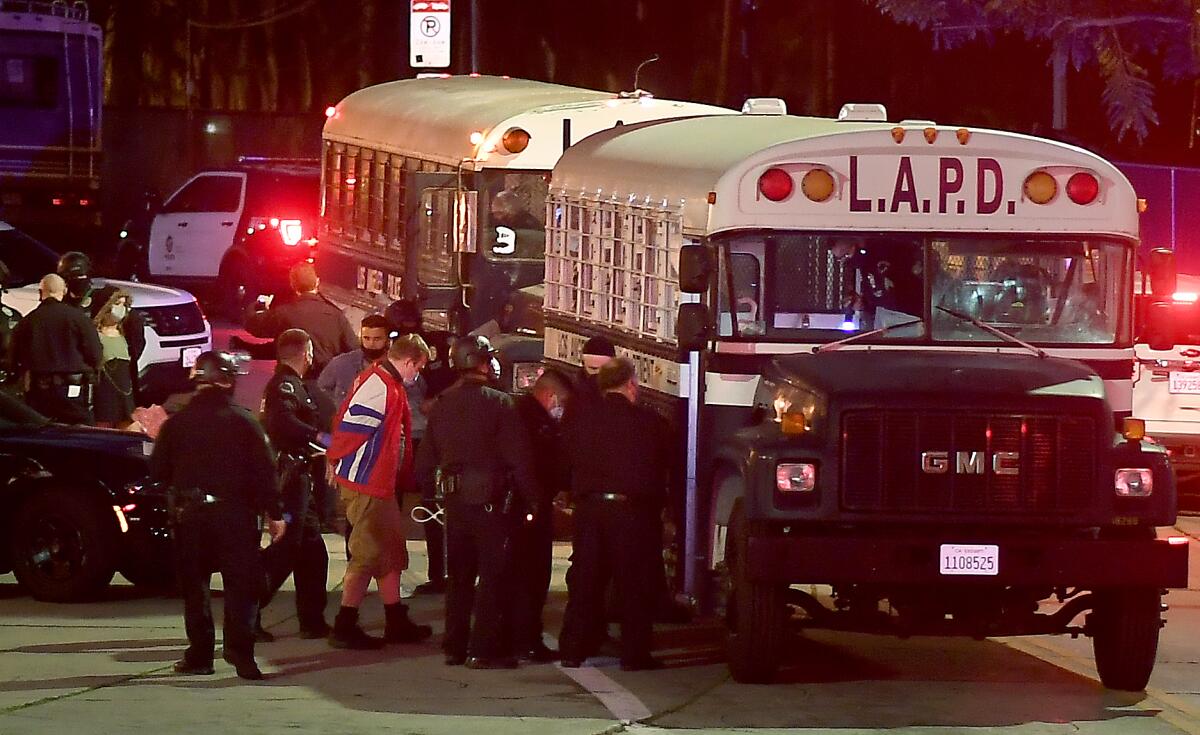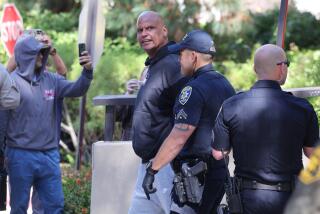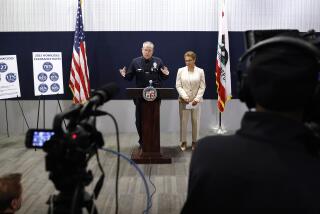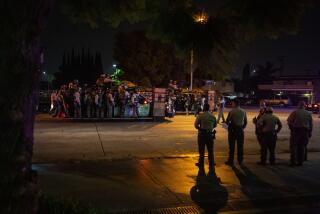Reporters, legal observers cry foul after being caught up in LAPD’s mass arrests at Echo Park protest

- Share via
Reporters and legal observers who were detained or arrested by the Los Angeles Police Department during a mass arrest of protesters in Echo Park on Thursday night were sounding alarms Friday — accusing the LAPD of ignoring their legitimate role in monitoring such events on the ground.
They also accused the LAPD of issuing confusing directives and attempting to force media members into a designated observation area that would not have allowed them to see the protest or the arrests that followed.
While some detained reporters and observers were released without being arrested, others — including reporters for less-established media brands — were held for hours and then formally charged, raising additional questions about police picking and choosing which outlets to acknowledge as legitimate.
“It’s an absurd conflict of interest,” said Jonathan Peltz, who was arrested while covering the events for Knock LA, a nonprofit newsroom affiliated with the progressive activist group Ground Game LA. “It should just be widely accepted that [police] are not the people who decide who is a journalist or where a media pen is.”
Julian Andrews, a TV cameraman who was in the field with Spectrum News reporter Kate Cagle and another colleague, said the actions of the LAPD — who led Cagle away and zip-tied her hands minutes before a planned live shot — were “unbelievable.”
“They knew she was a reporter. We were cameramen trying to do a story. We weren’t causing any disruption,” Andrews said. “I was honestly shocked. I couldn’t believe it.”
Cagle was later released without arrest, as was James Queally, a reporter for The Times who also was detained while covering the protest. Queally called the experience “maddening.”
Peltz said at one point, he was sitting next to Queally, both of them in zip ties, commiserating about the LAPD’s actions.
“What is this, arrest a journalist night?” Queally quipped.
The LAPD said Friday that officers had made “extraordinary efforts” to allow the protest to play out peacefully, but ultimately arrested 182 people after declaring the gathering near Lemoyne Street and Park Avenue unlawful and issuing a dispersal order. They cited the alleged use of strobe lights by some in the crowd as the reason for the order, saying attempts to extract only those responsible for the lights had been rebuffed by the larger crowd.
“Once the decision was made to initiate arrests, the crowd was surrounded and individually taken into custody without incidence of force or injury,” the LAPD said. It also said two officers suffered minor injuries, and that officers fired 10 hard foam or bean bag projectiles during the course of the protest “in response to projectiles thrown at officers.”
The department said three people among those detained identified themselves as members of the media, while others identified themselves as legal observers with the National Lawyers Guild, and that those people were “released at scene without further action.”
Not everyone who said they were a reporter was released, though. Among those who went to jail were Peltz and his Knock LA colleague, Kate Gallagher.
Peltz said he had heard the LAPD make an announcement about the media, but couldn’t make it out fully. It just sounded as though they were telling media to leave, which didn’t sound legitimate to him, he said.
“Nobody knows how to take that. It doesn’t sound legal. I’ve never heard that at another protest,” he said. “There seems to be a willingness on the part of the police force to not have any consistent rules or laws for people to follow, yet their excuse for arresting people is they weren’t following the rules.”
Once Peltz was detained, he said he told police he was press but was ignored.
“You just got the feeling that you either weren’t believed, or it didn’t really matter,” he said. When he later found out that reporters with LAPD-issued credentials from larger outlets were released, he was frustrated, he said.
“Why are they the ones giving out these credentials?” he said of police. “Why are they the ones deciding, especially when they are the ones being written about?”
Peltz’s editor, Liam Fitzpatrick, said he spent a frantic few hours trying to find out where Peltz and Gallagher had been taken, which ended up being the Metropolitan Detention Center downtown.
“I called the Metro Detention Center asking if they’d been booked, and whatever, they gave me that cop run-around thing like, ‘Well they’re not in the system yet so we can’t say where they are,’” Fitzpatrick said. “We couldn’t find where anybody was. We called and left messages for the media relations officers. Didn’t hear anything.”
In a statement, the National Lawyers Guild denounced the actions of the LAPD, including the detention of its members and members of the media, as “unlawful and shameful” and reflective of tactics that have been the subject of legal settlements against the department in the past.
It did not say how many of its members were detained, but called on City Attorney Mike Feuer to drop all charges stemming from the protest.
The ACLU of Southern California condemned the LAPD’s actions as a misguided attempt to hide from scrutiny the “militarized action” its officers were taking to clear Echo Park Lake.
“Mass arrests of protesters, legal observers and journalists will not keep the city’s brutal, ill-conceived actions from being known,” the ACLU said. “The city leaders who approved this approach should be held accountable.”
Andrews, the TV cameraman who filmed his Spectrum News colleague Kate Cagle getting plucked out of the crowd by officers, said he questions what motivated police to detain her, even if they did eventually let her go.
Andrews said Cagle had told him to start recording as she stepped forward to prepare for her live shot, just in case she was arrested. He said he had laughed in response, thinking the idea ridiculous, but started recording anyway.
Then it happened. Cagle, square in the frame of his camera, was approached by several officers, grabbed and pulled away, even though it was absolutely clear she was a reporter, Andrews said.
“They came for her, right when she was out in the open,” he said. “I can’t believe it.”
More to Read
Sign up for Essential California
The most important California stories and recommendations in your inbox every morning.
You may occasionally receive promotional content from the Los Angeles Times.











